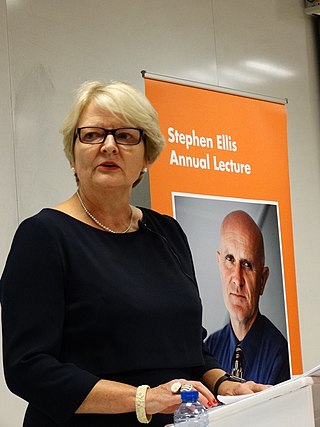
Jonathan Wolff is a British philosopher and academic. He is the Alfred Landecker Professor of Values and Public Policy at the Blavatnik School of Government at the University of Oxford and Governing Body Fellow at Wolfson College. Prior to his joining the Blavatnik School in 2016, Woolf's academic career had been spent at University College London (UCL), where he was, latterly, Professor of Philosophy and Dean of the Faculty of Arts and Humanities.
Sir Brian Howard Harrison is a British historian and academic. From 1996 to 2004, he was Professor of Modern History at the University of Oxford. From 2000 to 2004, he was also the editor of the Oxford Dictionary of National Biography.
Gillian Rose FBA is a British geographer and geographic author. She is a professor of human geography in the School of Geography and the Environment at the University of Oxford. Previously, she taught and served as Associate Dean at The Open University. She is best known for her 1993 book, Feminism & Geography: The Limits of Geographical Knowledge.

Lucia ZednerFBA is a British legal scholar. She is a professor of criminal justice at the University of Oxford and a senior fellow of All Souls College, Oxford.

Sir Paul Collier, is a British development economist who serves as the Professor of Economics and Public Policy at the Blavatnik School of Government at the University of Oxford and co-Director of the International Growth Centre. He is also a Professeur invité at Sciences Po and a Professorial Fellow of St Antony's College, Oxford.

Susan Jane Smith is a British geographer and academic. She was mistress of Girton College, Cambridge from 2009 to 2022. Smith previously held the Ogilvie Chair of Geography at the University of Edinburgh from 1990 to 2004 and until 2009 was a professor of geography at Durham University, where she played a key role in establishing the Institute of Advanced Study. On 1 October 2011, she was conferred the title of Honorary Professor of Social and Economic Geography in the Department of Geography at the University of Cambridge for five years, which was renewed until 2021.

Dame Henrietta Louise Moore, is a British social anthropologist. She is the director of the UCL Institute for Global Prosperity at University College, London, part of the Bartlett, UCL's Faculty of the Built Environment.
Dame Sarah Jane Whatmore is a British geographer. She is a professor of environment and public policy at Oxford University. She is a professorial fellow at Keble College, moving from Linacre College in 2012. She was associate head (research) of the Social Sciences Division of the university from 2014 to 2016, and became pro-vice chancellor (education) of Oxford in January 2017. From 2018 she has been head of the Social Sciences Division.

The School of Social and Political Science (SSPS) at the University of Edinburgh is a unit within the College of Arts, Humanities and Social Sciences. Its constituent departments conduct research and teaching in the following disciplines:
Ray Hudson, FBA, FAcSS is a British academic. He holds the degrees of PhD and DSc from Bristol University and. DLitt from Durham University. He was Professor of Geography and Deputy Vice-Chancellor at Durham University. From 2014–2015 he was acting Vice-Chancellor and Warden of Durham University. Currently he remains as Emeritus Professor of Geography.

Gordon Leslie Clark, FBA FAcSS is an Australian economic geographer, academic, and consultant. He is former Executive Director of the Smith School of Enterprise and the Environment, University of Oxford (2013-2018) with cross appointments in the Saïd Business School and the School of Geography and the Environment. Clark's latest work focuses on the geographical structure and performance of financial markets and organisations. He wrote and co-wrote multiple books in these subjects, including The Geography of Finance, Sovereign Wealth Funds, and Institutional Investors in Global Markets.
Charlotte Ann Roberts, FBA is a British archaeologist, academic and former nurse. She is a bioarchaeologist and palaeopathologist, whose research focuses on health and the evolution of infectious disease in humans. From 2004 to 2020, she was Professor of Archaeology at Durham University: she is now professor emeritus.
Jonathan Richard Bradshaw, is a British academic, specialising in social policy, poverty and child welfare. He is Professor Emeritus of Social Policy at the University of York and a part-time Professor of Social Policy at Durham University. Since 2013, he has served as chairman of the policy committee of Child Poverty Action Group.
Alexandra Marie Walsham is an English-Australian academic historian. She specialises in early modern Britain and in the impact of the Protestant and Catholic reformations. Since 2010, she has been Professor of Modern History at the University of Cambridge and is currently a fellow of Emmanuel College, Cambridge. She is co-editor of Past & Present and vice-president of the Royal Historical Society.
Nicola Mary Lacey, is a British legal scholar who specialises in criminal law. Her research interests include criminal justice, criminal responsibility, and the political economy of punishment. Since 2013, she has been Professor of Law, Gender and Social Policy at the London School of Economics (LSE). She was previously Professor of Criminal Law and Legal Theory at LSE (1998–2010), and then Professor of Criminal Law and Legal Theory at the University of Oxford and a Senior Research Fellow of All Souls College, Oxford (2010–2013).
Harriet Ann Bulkeley is a British geographer and academic. She is Professor of Geography at Durham University. Bulkeley is also a coordinator in the Naturvation project. Through her work at Durham University, Harriet is involved in the ReInvent-EU project, which aims to encourage decarbonisation in 4 key areas: plastic, steel, paper and meat and dairy. Her research largely explores the politics and processes surrounding environmental governance, as well as the management of municipal waste in the United Kingdom and the politics, specifically urban politics, of climate change.
Sarah Elizabeth Curtis, is a British geographer and academic, specialising in health geography. From 2006 to 2016, she was Professor of Health and Risk at Durham University; she is now professor emeritus. A graduate of St Hilda's College, Oxford, she was Director of the Institute of Hazard Risk and Resilience at Durham between 2012 and 2016. She previously researched and taught at the University of Kent and at Queen Mary, University of London.

Paul Joseph Boyle,, FRSGS, FLSW is a British geographer, academic, and academic administrator. He was the Vice-Chancellor of the University of Leicester between 2014 and 2019. He had been Professor of Human Geography at the University of St Andrews from 1999 to 2014, and Chief Executive of the Economic and Social Research Council (ESRC) from 2010 to 2014. He took over as Vice-Chancellor of Swansea University at the end of the 2018/2019 academic year.
Nina Hallowell was a medical sociologist and Professor of Social and Ethical Aspects of Genomics at the Nuffield Department of Population Health, University of Oxford, England. Hallowell's research focused on patient's experiences of genetic testing, the sociology of risk, and the sociology of the body.
Mari Sako, is a Japanese-British scholar of business, specialising in global strategy, outsourcing and offshoring, and professional services. She earlier specialised in the economy of Japan and modern Japanese business. Since 1997, she has been Professor of Management Studies at Saïd Business School, University of Oxford. She was a fellow of Templeton College, Oxford from 1997 to 2007, and is now a fellow of New College, Oxford. She previously taught at the London School of Economics and Political Science.








